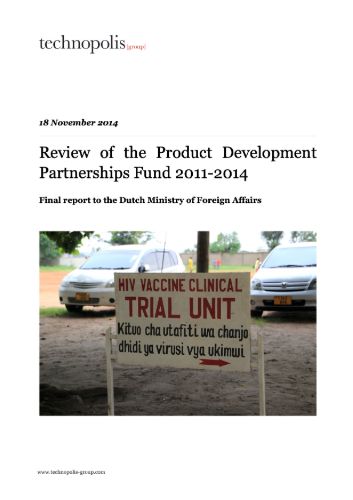Review Product Development Partnerships for fighting poverty related diseases
Publication date: 18 November 2014 | Report language: EN
Every year, poverty related diseases affect millions of people in the developing world. Yet, in the absence of clear profit potential, pharmaceutical companies are reluctant to invest in the development of treatments to fight these diseases. In response to this market failure, in the mid-1990s Product Development Partnerships (PDPs) emerged. PDPs use private sector approaches to tackle R&D challenges and target one or more poverty related diseases. In 2010 the Dutch Ministry of Foreign Affairs awarded €69.6m to seven PDPs for a period of four years (2011-2014): Aeras, DNDi, FIND, IAVI, IPM, Sabin and POW PDP. Collectively, these PDPs focus on improving the prevention, diagnosis and treatment of HIV/AIDS, tuberculosis and neglected tropical diseases (NTDs).The Technopolis Group conducted an independent external review of this fund. With Dutch support, the PDPs have successfully progressed a number of promising drug and vaccine candidates through their R&D pipelines. Several of these are currently in clinical trials. Other products have reached or are about to reach the market. Additionally, the PDPs have stimulated research capacity development in developing countries. Many of the PDPs have successfully leveraged Dutch support to secure additional funding from other donors. Conversely, although not an explicit grant requirement, many Dutch universities, companies and NGOs have been vital partners in the PDP activities and have benefited from the funding. However, since many of the products are still under development, a final conclusion on the fulfilment of the PDP Fund objectives is not feasible.The Technopolis Group advised the ministry of what factors should be taken into account in making a decision on possible continuation of the PDP Fund. The review contributed to a positive parliamentary advice from the minister on prolongation of the Dutch support to the PDPs.




